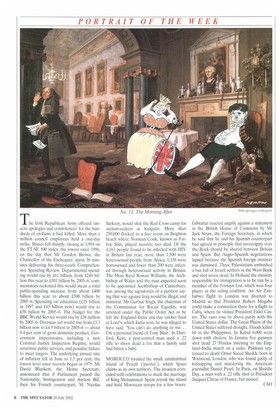T he Irish Republican Army offered 'sincere apologies and condolences' for
the hundreds of civilians it had killed. More than a million council employees held a one-day strike, Shares fell sharply, closing at 3,994 on the FT-SE 100 index, the lowest since 1996, on the day that Mr Gordon Brown, the Chancellor of the Exchequer, spent 36 minutes delivering his three-yearly Comprehensive Spending Review. Departmental spending would rise by £61 billion. from £240 billion this year to £301 billion by 2005-6; commentators reckoned this would mean a total public-spending increase from about £400 billion this year to about £500 billion by 2005-6. Spending on education (£29 billion in 1997 and .145 billion now) would rise to £58 billion by 2005-6. The budget for the BBC World Service would rise by 138 million by 2005-6. Overseas aid would rise from £3.3 billion now to £4.9 billion in 2005-6 — about 0.4 per cent of gross domestic product. Government inspectorates. including a new Criminal Justice Inspection Regime, would scrutinise public services, and penalise failure to meet targets. The underlying annual rate of inflation fell in June to 1.5 per cent, the lowest level since records began in 1975. Mr David Blunkett, the Home Secretary, announced that if Parliament passed the Nationality, Immigration and Asylum Bill, then his French counterpart, M. Nicolas
Sarkozy, would shut the Red Cross camp for asylum-seekers at Sangatte. More than 250,000 flocked to a free event on Brighton beach where Norman Cook, known as Fatboy Slim, played records; two died. Of the 4,163 people found to be infected with HIV in Britain last year, more than 1,500 were heterosexual people from Africa, 1,338 were homosexual and fewer than 200 were infected through heterosexual activity in Britain. The Most Revd Rowan Williams, the Archbishop of Wales and the man expected soon to be appointed Archbishop of Canterbury, was among the signatories of a petition saying that war against Iraq would be illegal and immoral. Mr Gurbux Singh, the chairman of the Commission for Racial Equality, was arrested under the Public Order Act as he left the England-India one-day cricket final at Lord's, which India won; he was alleged to have said: You can't do anything to me... I'm a personal friend of Tony Blair.' In Dartford, Kent, a pest-control man used a .22 rifle to shoot dead a fox that a family said had bitten a baby.
MOROCCO invaded the small, uninhabited island of Perejil ('parsley'), which Spain claims as its own territory. The invasion coincided with celebrations to mark the marriage of King Mohammed, Spain retook the island and held Moroccan troops for a few hours. Gibraltar reacted angrily against a statement in the British House of Commons by Mr Jack Straw, the Foreign Secretary, in which he said that he and his Spanish counterpart had agreed in principle that sovereignty over the Rock should be shared between Britain and Spain. But Anglo-Spanish negotiations lapsed because the Spanish foreign minister was dismissed. Three Palestinians ambushed a bus full of Israeli settlers in the West Bank and shot seven dead. In Holland the ministry responsible for immigration is to be run by a member of the Fortuyn List, which won four places in the ruling coalition. An Air Zimbabwe flight to London was diverted to Madrid so that President Robert Mugabe could make a connection there for a flight to Cuba, where he visited President Fidel Castro. The euro rose to above parity with the United States dollar. The Great Plains of the United States suffered drought. Floods killed 60 in the Philippines. In Kabul 6,000 went down with cholera. In Jammu five gunmen shot dead 27 Hindus listening to the England-India match on a radio, Pakistan sentenced to death Omar Saeed Sheikh, born in Wanstead, London, who was found guilty of kidnapping and murdering the American journalist Daniel Pearl. In Paris, on Bastille Day, a man with a .22 rifle shot at President Jacques Chirac of France, but missed.
CSH


























































 Previous page
Previous page